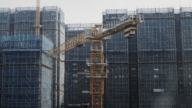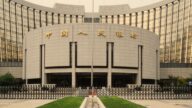【新唐人2014年09月01日訊】目前,大陸各地「救樓市」動作一浪接一浪,快到9月了,面對巨大的房地產市場新盤推出,和巨額庫存,各地政府不但全面取消限購,有的甚至要求銀行,降低第二套房貸首付比例。而房地產商各種促銷活動也五花八門。專家指出,過去兩年裡,面對樓市崩盤,政府不斷放水,使得他們對樓市泡沫破滅的分析,好像顯得不準確,不過今年下半年,估計放水也不管用了。
大陸同策諮詢研究部數據顯示,截至今年7月底,監測的一、二、三、四線35個城市,商品住宅纍計庫存余量超過3萬平方米,同比增幅39%,全國各大中城市普遍面臨「去庫存」壓力。
以北京為例,「亞豪機構」數據統計顯示,9月份北京商品住宅市場預計有39個項目入市,有望創下今年來的月度新高。其中不少醞釀多年的樓盤也準備入市。
9月北京供應大增的另一方面原因,是上半年大量房企沒有完成銷售目標,各項目不得不加快推盤節奏、調整定價策略,來完成全年銷售計劃。
而其地區也面臨同樣的情況,在香港上市的「佳兆業集團」和「招商局置地」,計劃在下半年推出今年70%的項目。而長沙樓市在9月份有近40個項目開盤推新,其中純新盤佔開盤數量的69%。
另外,截至8月27號,近百家上市房企已經曬出了中期「成績單」,其中98只地產股庫存增加超過2,200億元。
目前各地政府都在爭相取消限購政策,浙江杭州、陝西西安、貴州貴陽等地,都了宣佈全面取消住房限購。杭州更是要求人民銀行駐當地機構,降低第二套房貸首付比例。
北京師範大學MBA導師經濟專欄作家:「政策出臺的話,會好一點點,但是並不能改變房價大跌的趨勢,大家老百姓都知道房地產要崩盤了,畢竟市場的商品價格是由供求關係確定的,供過於求它就要跌價,這個趨勢誰也阻擋不了的。」
業內人士認為,全國樓市大範圍的「降價潮」即將來臨,將出現20%到30%的大幅降價。實際上在8月中旬,北京已經首次出現了降價20%的樓盤。
8月28號,《新華網》刊登題為「一位房管局長稱現在房子多得嚇人!」的博文。這位房管局長給出了房價大跌的3個理由,除空房太多外樓市銷售低迷,很多開發商都在悄悄降價出手也是主要原因,他透露稱,最高的降幅已經達到50%。
大陸經濟評論家牛刀指出,房價早就應該下跌,前幾年經濟學家唱空中國樓市,之所以不準,是因為每次房價下跌時,中共就採取各種方法救市,不斷通過銀行放水維護。
大陸經濟評論家牛刀:「但是這種放水維護到現在放水沒用了,現在的錢你只要放出來,人家就把房子賣掉,解套以後就逃到美國去了。最後買房的人是毀滅性的打擊,進去一批死一批。泡沫太大了,不是一點購買力能夠維持的。原來你買了以後,馬上能夠賣出去,現在你要賣出去簡直不可能,到後面沒有人接盤。它的風險在這兒。」
國內媒體報導,今年一月份,央行當月淨投放現金1.79萬億元,1月末廣義貨幣餘額112.35萬億元,不但房價沒有上去,而當月人民幣存款卻減少了接近1萬億。當時有分析認為,這是央媽用1月信貸數據,講了一個天方夜譚的故事。而今年7月,又有1.98萬億元人民幣存款消失。
目前各大房企都在加快跑量,促銷手段五花八門。大陸房產老大「萬科」在推出「全民經紀人」後,8月25號,又與「淘寶」合作,宣稱「淘寶用戶全年花掉的錢,都可以在萬科直接沖抵購房款,最高可抵扣200萬元」。央視評論說,「萬科」這種變相降價銷售,去庫存化,「淘寶」和「萬科」都是贏家。那麼誰是輸家呢?
採訪編輯/劉惠 後制/舒燦
More New Houses With Many In Stock, Are China’s House
Prices Near Collapse?
Mainland China has been actively
saving the real estate market.
With more new real estate properties coming in September,
and the already large housing stock, local governments lifted
limitations on house buying, even requesting banks to lower
mortgage down payments on second house purchases.
Real estate developers have had
various promotional activities.
Experts say the housing market has been facing
collapse in the past two years.
Now the government interference have made
people question their analysis.
It will be hard for the government to cover up the crisis
in the second half of this year.
Chinese real estate consulting company, Tospur, published
data showing that 35 major Chinese cities have 30,000m²
(322917ft²) in stock as of July, a 39% year on year increase.
Large and medium cities in mainland China all face
high pressure of destocking.
Looking at Beijing, Yahao Real Estate shows data that 39
projects are expected to launch in Beijing’s commodity
housing market in September, making it the highest on
record this year.
Many of the real estates properties have prepared for years
to join the market.
A reason for the high house supply in September in Beijing
is that many real estate companies failed to achieve sales
goals for the first half of the year. They have to complete
the annual sales plans.
So they are promoting more properties
and adjusting the prices.
Other cities face the same situation.
Kaisa Group and China Merchants Land Limited listed in
Hong Kong plan to promote 70% of their projects of the year.
Changsha City of Hunan Province will have 40 properties
in September, and 69% of them are new ones.
By August 27, nearly 100 real estate companies published
interim results.
These show the property shares in stock increased
by over 220 billion yuan ($35.8 billion).
Local governments in China have lifted restrictions
on house purchasing.
These include Hangzhou of Zhejiang Province, Xi’an of
Shaanxi Province, Guizhou of Guoyang Province, etc.
Hangzhou government even told the local People’s Bank
to lower mortgage deposits for second house purchases.
Duan Shaoyi, Economic column writer and MBA instructor
at Beijing Normal University, “the new policy may ease the
issue a little, but can’t change the trend of the price drop.
People all know that the real estate is going to collapse.
The market prices are based on supply and demand.
When supply is more than demand,
nothing can stop the price dropping.”
Experts believe nationwide price drop will come soon.
20 to 30% slashed prices will appear.
In fact, Beijing already had properties with a 20% price
drop in the middle of August.
On August 28, state-run Xinhua published a blog article
“A Director of Housing Management Department Said
Houses Are Horribly Too Abundant!” In the article, the
director gave 3 reasons for house prices dropping.
Too many house supplies; sales slump; and many
developers quietly lowering their prices.
The director exposed that the biggest price drop
has reached 50%.
Chinese economic commentator, Niu Dao, says house
prices should have reduced down long ago.
The Chinese Communist Party (CCP) tried everything to
save the market in the past years when the prices dropped.
Such as using banks to release more money.
Niu Dao, Chinese economic commentator, “but such money
releasing doesn’t work now.
Once you release money, people will sell their houses now.
Once people get out of trouble, they’ll escape to the US.
Those who buy houses last will suffer devastating blow.
Whoever buys will lose.
The bubble is too big, and can’t be supported by a
limited purchasing power.
In the past, you could sell a house soon after you bought it,
but now it’s impossible to sell it.
No one would take it. That’s the risk.”
The Central Bank released 1.79 trillion yuan cash in January.
The broad money balance was 112.35 trillion yuan by the
end of the month.
The housing price didn’t go up, and the deposit of the month
decreased for nearly a trillion, said Chinese press.
Analysis mocks that the Central Bank told a fantasy story
with the January data.
Another 1.98 trillion yuan of deposit disappeared in July.
All kinds of real estate companies have started to use
various promotion methods.
On August 25, leading real estate company Vanke Property
cooperated with leading online shopping website Taobao.
They said all expense at Taobao can substitute for payment
of houses at Vanke Property by up to 2 million yuan.
The Chinese Central Television comments that it’s
a win-win method for both Vanke and Taobao.
However, who is going to lose?
Interview & Edit/LiuHui Post-Production/SuChan

























